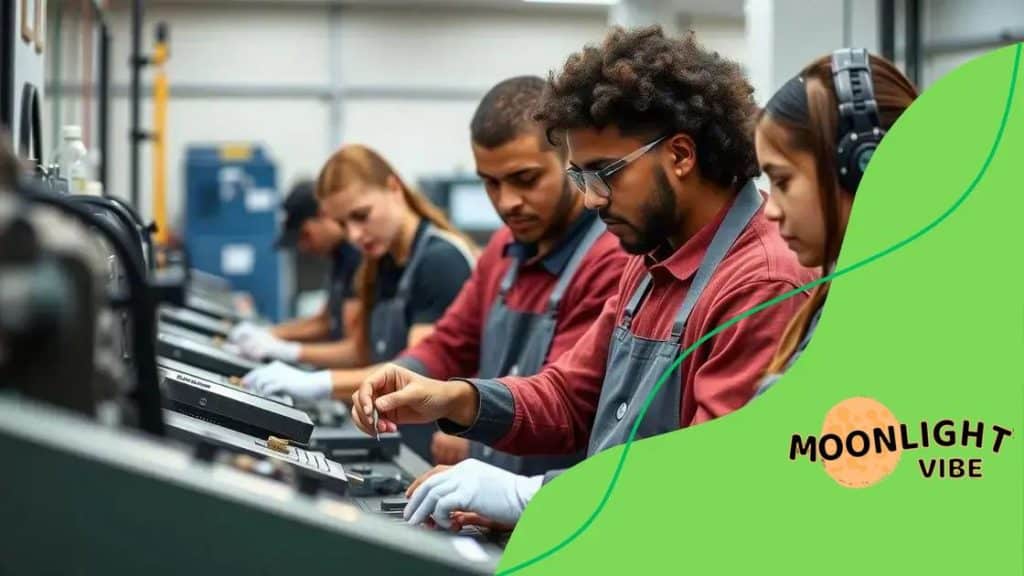Future trends in vocational education for modern careers

Anúncios
Future trends in vocational education focus on industry partnerships, personalized learning experiences, and the integration of technology, ensuring students gain relevant skills and real-world experience tailored to job market demands.
Future trends in vocational education for modern careers are reshaping how individuals prepare for the ever-evolving job market. Have you ever wondered how these changes might affect your career path? Let’s explore what lies ahead.
Anúncios
The evolution of vocational education
The evolution of vocational education has been significant in addressing the changing demands of the job market. Over the years, vocational training has transformed to meet the needs of a diverse workforce. No longer just focused on manual skills, modern vocational education incorporates technology and critical thinking.
Adapting to Modern Needs
As industries evolve, so do the skills required to succeed. Educational institutions now emphasize flexibility in their programs. Students learn both hard and soft skills, which are essential for today’s employers. These institutions often collaborate with businesses to ensure that students gain relevant experiences.
Key Components of Current Programs
- Integration of technology in learning environments.
- Emphasis on hands-on experience and internships.
- Focus on developing soft skills like communication and teamwork.
Additionally, vocational education has become more accessible. Online courses and flexible scheduling allow students to balance work and school obligations. This accessibility encourages a wider range of people to pursue careers in fields like healthcare, technology, and trades.
Anúncios
Modern vocational programs also highlight the importance of lifelong learning. As technology changes at a rapid pace, individuals must continuously update their skills. Certifications and short courses are becoming popular, giving workers tools to adapt and thrive.
The Role of Technology
The impact of technology on vocational education is profound. Online platforms provide innovative ways to engage students and enhance learning. Virtual simulations and interactive modules help learners practice skills in a safe environment.
This shift not only benefits students but also employers. Companies can invest in training programs that align with their specific needs, ensuring a better fit for their workforce. As a result, the relationship between education and employment strengthens, leading to more successful career outcomes.
Key skills for modern careers
In today’s job market, understanding the key skills for modern careers is essential for both students and professionals. As industries evolve, the demand for specific skills changes, highlighting the need to adapt and learn continuously. Key skills vary across sectors but share common traits that enhance employability.
Essential Skills for Success
Adaptability is a vital skill that allows individuals to thrive in various environments. The ability to learn new technologies and adjust to shifting workplace dynamics is crucial. Moreover, strong communication skills ensure that team members can collaborate effectively, which is especially important in remote work settings.
- Problem-solving abilities can drive innovation and efficiency.
- Critical thinking enables informed decision-making.
- Emotional intelligence helps manage relationships in the workplace.
Technical proficiency has also become a crucial asset. Many careers require familiarity with software tools, coding languages, or data analysis. As automation and technology become integral parts of various jobs, workers must be comfortable using new tools.
The Importance of Lifelong Learning
Lifelong learning is essential in acquiring these key skills. Professionals should seek opportunities for continuous education through workshops, online courses, or certifications. This approach not only keeps skills relevant but also opens doors for advancement in their careers.
Networking is another important component of modern career success. Establishing connections within their industry can lead to new opportunities and insights. Individuals who actively engage with professional communities tend to stay informed about emerging trends and job opportunities.
The blend of technical and soft skills contributes significantly to a successful career. Employers today are looking for rounded individuals who can bring both expertise and a collaborative spirit to the team. Cultivating these skills allows professionals to navigate the complexities of modern workplaces effectively.
Technology’s role in vocational training

Technology plays a pivotal role in modern vocational training, revolutionizing how students acquire new skills. The integration of advanced tools enhances learning experiences, making education more effective and engaging.
Enhancing Learning Through Technology
With the help of technology, students can access a wealth of resources online. This includes video tutorials, interactive simulations, and virtual classrooms. These tools promote a learner-centered approach, allowing individuals to progress at their own pace.
- Online platforms enable flexible schedules for learners.
- Virtual reality (VR) immerses students in realistic scenarios.
- Gamification tools make learning more engaging and fun.
Additionally, technology allows educators to monitor student progress more closely. Data analytics provide insights into areas where students may struggle, enabling tailored interventions. This personalized approach ensures every learner gets the attention they need.
Collaboration and Remote Learning
Technology also facilitates collaboration among students and instructors, regardless of geographical location. Online forums and collaborative tools support teamwork and knowledge sharing in real time. These platforms help students develop important communication skills essential for the workplace.
Moreover, remote learning opportunities have expanded access to vocational training. Individuals who may not have been able to attend traditional classes can now pursue education from anywhere. This accessibility is paving the way for a more inclusive workforce.
As new technologies emerge, vocational training is likely to continue evolving. Innovations such as artificial intelligence (AI) and machine learning can further enhance the training process, making it more efficient. Thus, students will be better prepared to meet the demands of the job market.
Personalized learning experiences
Personalized learning experiences are becoming a crucial aspect of modern vocational education. This approach tailors education to meet the unique needs of each student, ensuring a more effective learning journey. By focusing on individual strengths and challenges, programs can foster greater engagement and achievement.
Understanding Personalized Learning
Personalized learning shifts the traditional educational model by allowing students to progress at their own pace. Through assessments and feedback, educators can identify the specific skills each learner needs to develop. This skill-based approach ensures that weaknesses are addressed while strengths are enhanced.
- Customizable learning paths help students set and achieve their goals.
- Diverse resources cater to different learning styles, such as visual or auditory methods.
- Continuous feedback keeps learners informed of their progress.
Integrating technology plays a significant role in creating personalized experiences. Learning platforms often use algorithms to recommend resources and activities tailored to individual needs. This adaptability allows for a more engaging and relevant educational experience.
Benefits of Personalized Learning
One of the key benefits of personalized learning is increased motivation. When students see their progress in real-time, they are more likely to stay committed to their education. Furthermore, personalized experiences can lead to better retention of information, as students engage more deeply with content that resonates with them.
Collaboration is also enhanced in personalized learning environments. Students often work together on projects that align with their interests, fostering teamwork and communication skills. This peer interaction mirrors real-world work settings where collaboration is essential.
As educational practices continue to evolve, the emphasis on personalized learning experiences is likely to grow. This change not only benefits students but also prepares them better for the demands of modern careers. With personalized approaches, vocational education can produce skilled individuals ready to thrive in their chosen fields.
Partnerships with industries for better outcomes
Partnerships with industries are essential for improving outcomes in vocational education. These collaborations create a bridge between educational institutions and the job market, ensuring that students are equipped with the relevant skills needed in today’s workforce.
The Importance of Industry Collaboration
When educational institutions work closely with businesses, they can tailor their programs to meet specific industry needs. This alignment enhances the quality of education and helps students gain practical experience. Internships and apprenticeships are prime examples of how students can apply what they learn in real-world settings.
- Access to state-of-the-art technology and resources.
- Input from industry experts helps shape curriculum content.
- Job placement opportunities lead to higher employment rates.
Such partnerships also provide valuable networking opportunities. Students can connect with potential employers while still in school, giving them a competitive edge when entering the workforce. These connections often lead to job offers and mentorship opportunities that benefit students in their career journeys.
Real-World Applications
One significant benefit of partnerships is the opportunity for hands-on learning. Programs collaborating with local industries can offer students practical experience in their field of study. This real-world perspective enhances theoretical knowledge and prepares students for the challenges they will face after graduation.
Moreover, industries gain from these partnerships by cultivating a skilled workforce tailored to their needs. By investing in education, they ensure that new employees are ready to contribute effectively from day one. Companies can significantly reduce training time and costs.
As the job market continues to evolve, the importance of such partnerships will only increase. Educational institutions that foster these relationships are likely to produce top-tier graduates with the skills and experience necessary for success.
FAQ – Frequently Asked Questions about Partnerships in Vocational Education
Why are partnerships with industries important for vocational education?
Partnerships ensure that vocational training aligns with industry needs, leading to more relevant skills for students and better job placement rates.
How do students benefit from industry partnerships?
Students gain hands-on experience through internships and apprenticeships, and they also have opportunities to network with potential employers.
What role does practical experience play in vocational training?
Practical experience allows students to apply what they’ve learned in real-world settings, enhancing their skills and boosting their confidence.
How can educational institutions strengthen their industry partnerships?
By collaborating closely with local businesses, seeking their input in curriculum development, and offering tailored training programs.





